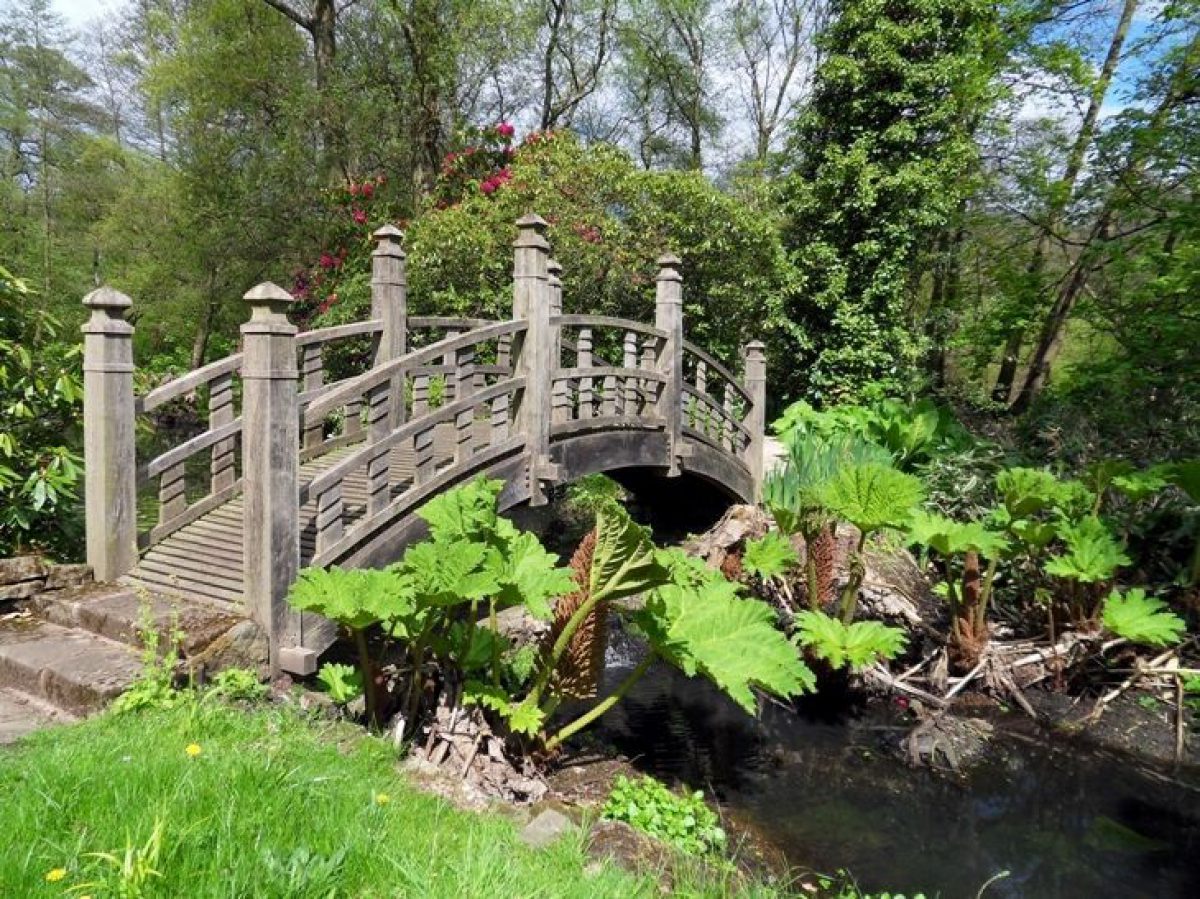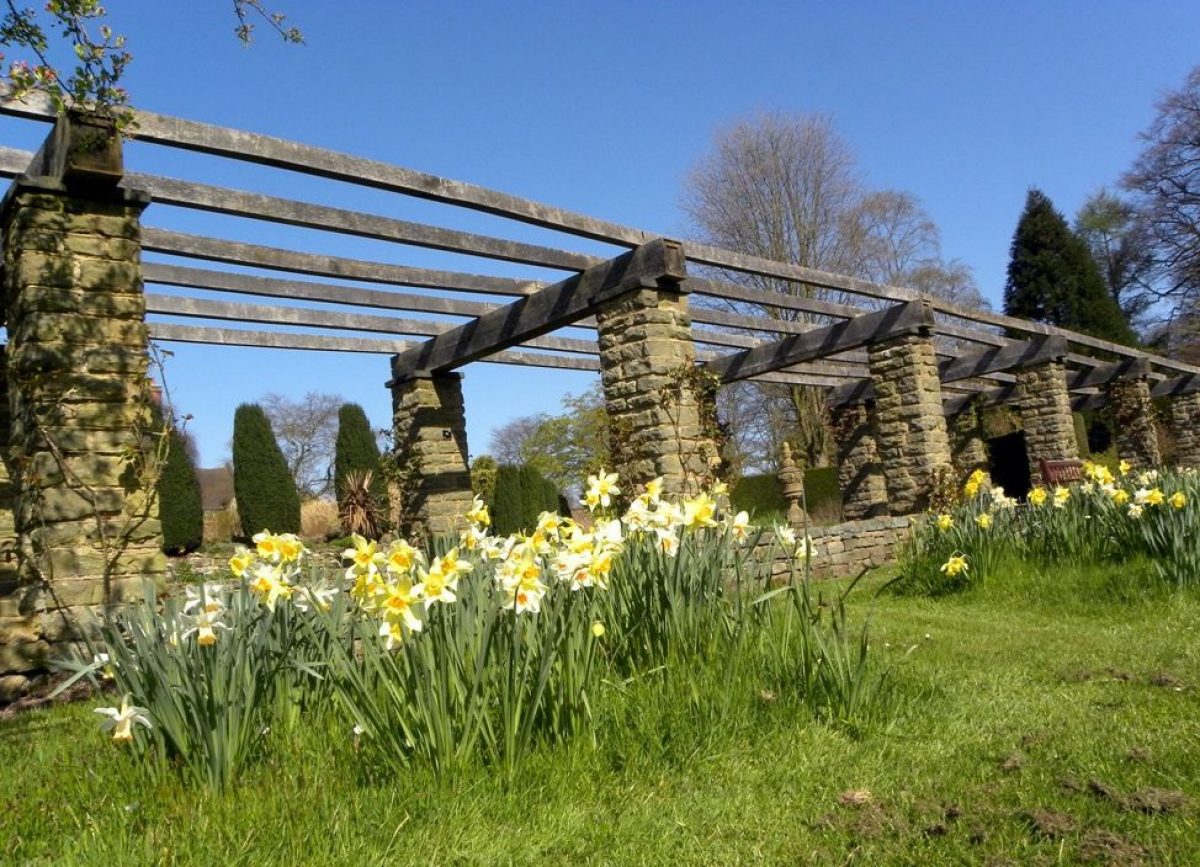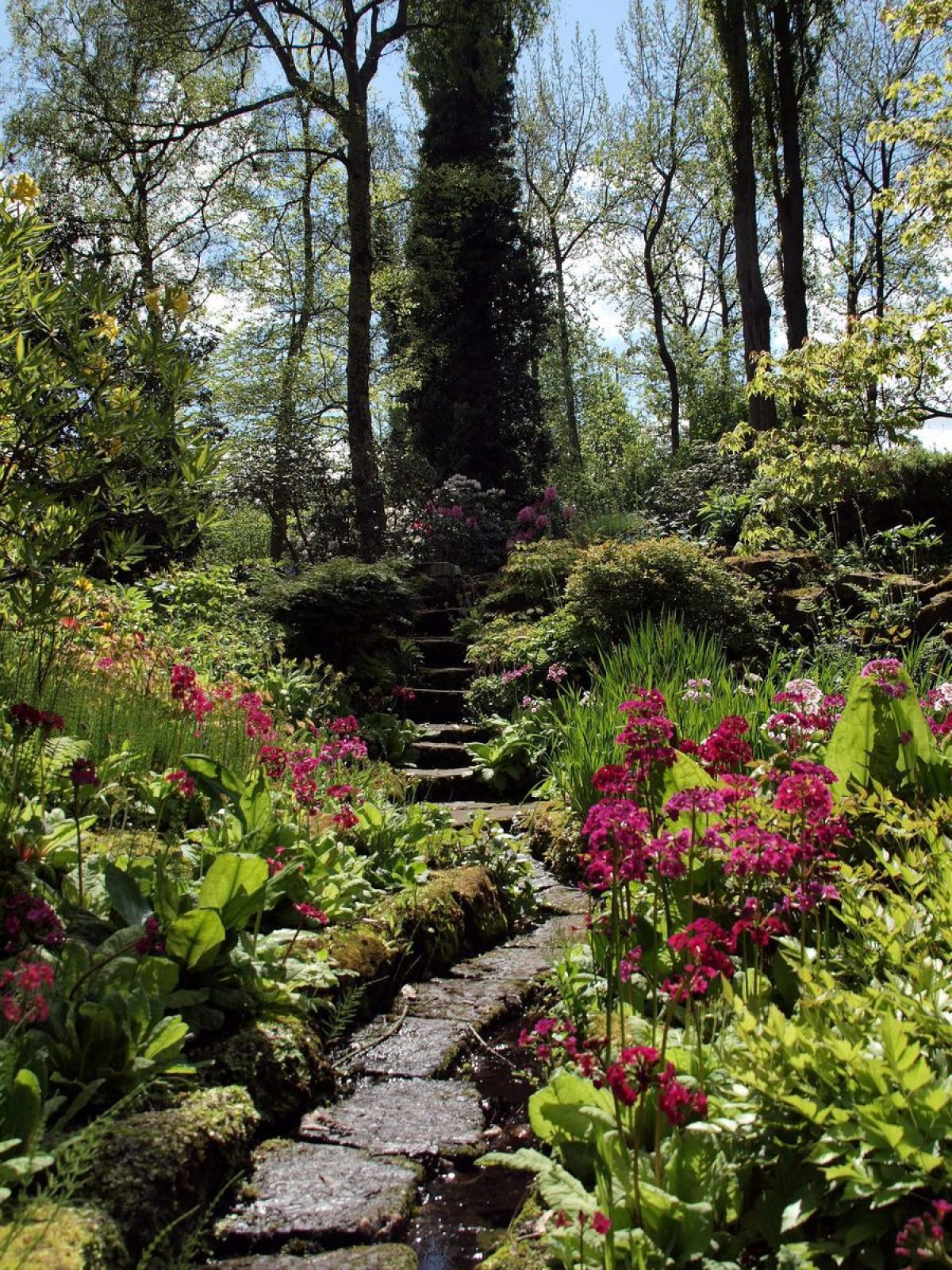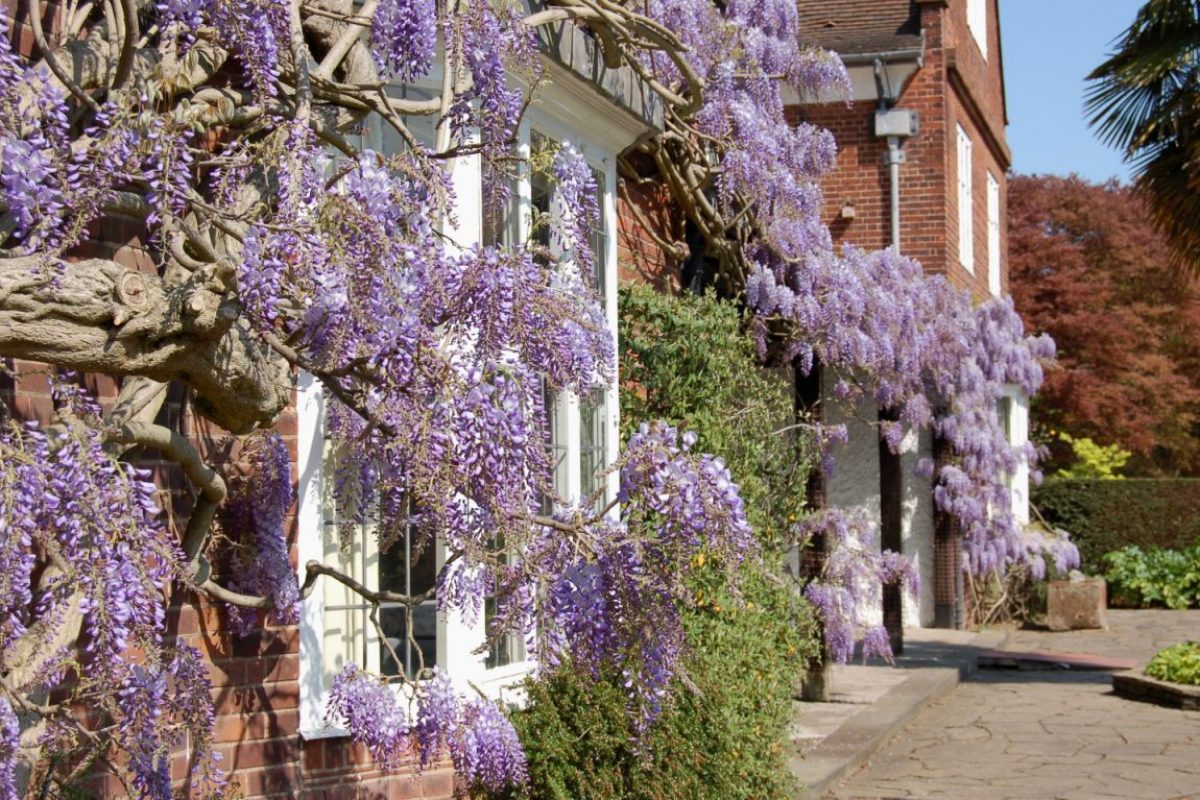



Introduction
Winterbourne has extensive gardens of 1903 in the Arts and Crafts style created by Margaret Nettlefold. The gardens surround the large, contemporary, house built for Margaret Nettlefold and her husband John, a Birmingham industrialist.
Terrain
From the eastern boundary the grounds of Winterbourne run downhill to the east to Edgbaston Pool.
The following is from the English Heritage Register of Parks and Gardens of Historic Interest:
Extensive garden of 1903 in the Arts and Crafts style created by Margaret Nettlefold around the large, contemporary, house built for herself and her husband John, a Birmingham industrialist.
DESCRIPTION
LOCATION, AREA, BOUNDARIES, LANDFORM, SETTING
The property fronts Edgbaston Park Road which still largely forms the east boundary of the campus of Birmingham University. From this the grounds of Winterbourne run downhill to the east to Edgbaston Pool, part of the Registered Historic Park and Garden of Edgbaston Hall (GD 2207). The Pool and its wet woodland surroundings are a SSSI, while it and Winterbourne are within the Edgbaston Conservation Area. Abutting Winterbourne to the south are school sports facilities. To the north is the university's Botanical Centre. The area of Winterbourne's gardens is c.4.5ha.
ENTRANCES AND APPROACHES
Winterbourne is approached from the west directly off Edgbaston Park Road. A short tarmac drive gives access to car parking in front of Winterbourne and to the large car park which serves the 1960s library building to its south.
PRINCIPAL BUILDING
Winterbourne (listed Grade II) was built in 1903-4 in red brick in the C17 style. Long and low with a wavy ridge line and multiple chimney stacks; the entrance front to the west has two short projecting wings, that to the right with a gabled porch signifying the front door. To the left is a lower and simpler service range. The garden front to the east has the same arrangement but with a long verandah giving views over the garden between projecting cross wings to either side. Offset to the north of the service buildings, and entered from the area to the front of the house through a gateway with tall brick piers and stone ball finials, are two short parallel ranges in a similar style, built as a coachhouse and groom's accommodation, and cowhouse (mapped in 1903 as 'lodge, stable and farmery'). These saw alteration in 1929, and are now used as reception buildings and offices for the University Botanic Garden.
To the south of Winterborne is a large, flat-roofed buff brick library building of 1966 by the John Madin Design Group.
GARDENS AND PLEASURE GROUNDS
Winterbourne's gardens remain relatively little altered from Margaret Nettlefold's original design. Originally, in the early C20, photographs indicate that the approach to the house from the west was via a curving tree-lined drive across an informal field-like setting to a gravelled forecourt. Tennis courts were laid out here by the university after the Second World War. After the Extramural Department moved to Winterbourne in 1963 a library was built to the south of the approach drive in 1966 served by a large car park. North of the drive is an informal lawn with specimen trees.
Abutting the south side of the house is an enclosed stone and herringbone brick-paved courtyard, quartered about a central Venetian well head (introduced in the 1930s); originally this was called the Dell Garden (with a loggia, no longer extant, against the house) but later the Trough Garden after stone troughs used to grow alpines.
The main gardens flow east from the house. Running along the east side of the house is a broad terrace, originally gravelled but irregularly stone-paved since 1926 or before. There is a sundial at its south end, and a palm tree was planted in the centre of the terrace in the later C20. The terrace links to the south with the Trough Garden, and to the north with a path flanked by the Pink and Blue Border which leads to the southern gateway into the Walled Garden. The terrace is well-detailed, with a brick balustrade, stone ball finials, and raking brick buttresses, and at its south end a substantial flight of convex brick steps. These lead down to the Top Lawn, a large, formal, rectangular, lawn (used for tennis in the 1920s), with an herbaceous border along its west edge against the terrace. Pleached limes which ran along its south edge are represented by a single surviving lime. A line of Irish yews (probably 1920s) with two dry stone walls beneath, along which is the red orange and yellow border, separate the Top Lawn from the Bottom Lawn to its east, the latter being bisected by a long pergola with stone piers (again probably 1920s and reminiscent of that at Hestercombe) and a flagged stone walk beneath. At the north end of the west part of the lawn, set against a yew-hedged semi-circle, is the Herb Circle with a relocated terracotta finial as a centrepiece (Herb Circle and hedge created in the late C20).
Beyond the north end of the Bottom Lawn the gardens become less formal, running downhill and then doglegging to the south; in the early C20 this area was paddocks and orchard. Firstly, beyond a triangular area of informal lawn with some specimen trees, in an area where five springs rise, is a large rock and water garden. This was described briefly by County Life in 1911 ('toy precipices and other pleasant conceits marking the zeal of the gardener who holds the mirror up to Nature'); documentary evidence suggests it was laid out in 1907 by the local firm Baker's of Codsall, near Wolverhampton. It may have been extended a little in Nicolson's time. Planting includes Japanese maples, dwarf rhododendrons and azaleas. A wooden shelter-like Japanese tea house was built on its upper edge by Nicolson, near which in 1937 he added a new rockery of Westmorland stone supplied by Gordon Veitch of Hazlewood nurseries of nearby Acock's Green. Another seat, the 'lychgate', was added at much the same time on the Broad Walk down the north-east edge of the site. From the rock garden there is a view southward down the remainder ofthe garden, along a broad stream spanned by a Japanese-style bridge of 1930 (renewed in replica c.2000) introduced by Nicolson to enhance the then-fashionable Japanese character of this part of the gardens. To the west of the stream is an informal lawn bordered with magnolias, while to the west (outside the registered area) is the wet woodland of the Edgbaston SSSI which provides an always acknowledged contrast to the garden.
The upper, north-east, part of the garden, east of the walled garden, is largely asdeveloped piecemeal by the University after the Botanic Garden was established in the mid C20. East of the walled garden (where the Nettlefolds' children had a sand pit) is a mid C20 brick and glass orchid house, beyond which is an Alpine Yard re-established in 2006 with a new cedar alpine glasshouse. South of this is the Scree Garden, laid out with alpines in the 1930s by J M Nicolson, linked by a path running south-west to the Petal Garden (also Nicolson's work, replacing a shrubbery) which has a series of curving paths laid out to resemble a rose petal. East of the Petal Garden is The Geographics, a lawned area with beds with plants from different continents laid out by the University in the later C20. At its centre is a wooden ship for children to play on. The final feature in this area, running roughly east from the edge of the Petal Garden to the Broad Walk along the north-east boundary of the site is the Nut Walk of coppiced hazel cultivars; part of the original garden, its curving metal framework was renewed in the 1980s.
KITCHEN GARDEN
The north side of the house is abutted by the walled kitchen garden of 1903, bounded to the north by the farmery. The garden, roughly square and c. 35m across, is bounded by red-brick walls c. 2.7m high. That to the east, along what is effectively the bottom of the garden, is a shallow serpentine or 'crinkle crankle' wall originally used for fruit growing. Two of the four gateways are unaltered: the east gateway which is tall, round arched, with the wall to either side ramping up to square piers; and that to the south which has stone ball finials to the posts with iron gates. Along the west half of the north wall, and running downhill (rather than being terraced or otherwise treated to give a level build), is a 20m long, good-quality lean-to greenhouse. This was rebuilt in 2006. At the garden's centre is a dipping well. While originally the house's productive garden it was later laid to lawns with multiple formal flower beds which is how it remains. A rustic pergola, no longer present, originally spanned the main E-W path across the garden.
REFERENCES
M E Macartney, Recent English Domestic Architecture (1908)
P Ballard, 'A Small Country House in Birmingham: Winterbourne and its Garden 1903-1995' (1995)
Country Life 1 July 1911
A Foster, The Buildings of England: Birmingham (2005), 250-1
A Darby, 'Winterbourne Botanic Garden: Conservation Statement' (January 2007).
MAPS
OS 25" to 1 mile: 2nd edition, published 1904; 3rd edition, published 1917; 4th edition, published 1938
Description written: January 2008
Winterbourne is recommended to be added to the Register of Historic Parks and Gardens, for the following principal reasons:
* As a well-preserved Arts and Crafts garden
* As the setting for one of Birmingham's best-surviving industrialist's houses of the late C19/early C20.
- Visitor Access, Directions & Contacts
Telephone
0121 414 3003Website
https://www.winterbourne.org.ukAccess contact details
The site is open from 10.30 am seven days a week. It closes at 5.30 pm between April and October, and 4 pm in the winter months. For Christmas and New Year arrangements please consult the website www.winterbourne.org.uk
Directions
Owners
University of Birmingham
58 Edgbaston Park Road, Edgbaston, Birmingham, B15 2RTOther Websites
- History
The following is from the English Heritage Register of Parks and Gardens of Historic Interest:
HISTORIC DEVELOPMENT
In 1786 the rural Calthorpe Estate, in Edgbaston on the south edge of Birmingham, began to grant building leases. The area soon became popular with industrialists who wished to move their families out of the industrial city to more commodious surroundings. In the 1880s a number of properties were built on Edgbaston Park Road, and in 1902 the industrialist John Nettlefold, whose extended family had already built several houses on the Birmingham fringe, acquired a ten-acre parcel of meadow fronting onto this on which to build a new house, just a mile and-a-half from the city centre. His family firm, Nettlefold Ltd (formerly Nettlefold and Chamberlain; later Guest, Keen and Nettlefold), had become the world leader in wood-screw manufacture by the 1870s, and John Nettlefold's standing was further enhanced by his marriage in 1891 to Margaret Chamberlain, the daughter of Arthur Chamberlain, a fellow Birmingham industrialist and younger brother of the politician Joseph Chamberlain. After his marriage Nettlefold became managing director of Kynochs, a large munitions firm of which his father-in-law, Arthur Chamberlain, was chairman. Beyond work, as chairman of the Housing Committee Nettlefold philanthropically promoted the garden suburb policy for Birmingham, visited Germany to study town planning, and in 1914 published Practical Town Planning, a commonly-used student text in the early C20.
On leasing the site (the agreement requiring that the new house cost at least £4,000 to maintain the exclusivity of the area) the Nettlefolds commissioned the local architect JL Ball to design a house for them and their five children. Called Winterbourne, this was in the Arts and Crafts style and was of the type sometimes characterised as 'the small country house', including within its boundary provision for a dairy cow and a paddock for horses as well as having pleasure grounds and a productive garden. Long, low, in red brick and in C17 style, the house was deliberately archaic, with a wavy ridge line giving an air of antiquity. The house was favourably discussed in ME Macartney's Recent English Domestic Architecture (1908) and by Country Life in 1911.
The Nettlefolds sold the property in 1919 (after John became ill) to Harry Wheelock, a Birmingham stockbroker. Later, in 1925, it was acquired by John MacDonald Nicolson (d.1944), a Birmingham draper. The house and its grounds were bequeathed to the University of Birmingham by Nicolson in 1943. At first it was used as additional accommodation for women students before, in 1966, the Extramural Department (later the Department of Continuing Education) moved to Winterbourne. In 2008 the future use of the main house was under discussion.
The hard landscaping of the terrace and walled garden garden is known to have been by Ball, but the gardens themselves were designed by Margaret Nettlefold who is believed to have been inspired by the books and garden designs of Gertrude Jekyll. In the 1930s the gardens were added to by John MacDonald Nicolson, who created the Scree Garden and small alpine features around the garden. Nicolson's 1943 bequest of Winterbourne to the University expressly included a request that the garden should be kept up 'in something like its present form' (Ballard 1995, 32). The grounds were placed in the care of the Department of Botany c.1944, designated the University's Botanic Garden, and soon after extended by purchase of part of the grounds of Westmere to the north (not included in Registered area). The Department continued to add to the range of planting until it relinquished the garden to the Department of Continuing Education in 1989. As the Winterbourne Botanic Garden this remains a teaching resource as well as being open to the public.
Period
- 20th Century (1901 to 2000)
- Early 20th Century (1901 to 1932)
- Features & Designations
Designations
Conservation Area
- Reference: Edgbaston Conservation Area
The National Heritage List for England: Register of Parks and Gardens
- Reference: 5337
- Grade: II
The National Heritage List for England: Listed Building
- Reference: Winterbourne
- Grade: II
Style
Arts And Crafts
Features
- House (featured building)
- Description: Winterbourne was built in 1903-4 in red brick in the 17th-century style. The building is long and low with a wavy ridge line and multiple chimney stacks. The entrance front to the west has two short projecting wings, that to the right with a gabled porch signifying the front door. To the left is a lower and simpler service range.
- Earliest Date:
- Latest Date:
- Drive
- Description: A short tarmac drive.
- Courtyard
- Description: Abutting the south side of the house is an enclosed stone and herringbone brick-paved courtyard.
- Well Head
- Description: Venetian well head.
- Earliest Date:
- Latest Date:
- Terrace
- Description: Running along the east side of the house is a broad terrace, originally gravelled but irregularly stone-paved since 1926 or before.
- Sundial
- Border
- Description: The Pink and Blue Border.
- Balustrade
- Description: Brick balustrade on the terrace.
- Finial
- Description: Stone ball finials.
- Steps
- Description: A substantial flight of convex brick steps.
- Lawn
- Description: Top Lawn and Bottom Lawn.
- Herbaceous Border
- Tree Feature
- Description: A line of Irish yews (probably 1920s) with two dry stone walls beneath, along which is the red, orange and yellow border, separate the Top Lawn from the Bottom Lawn.
- Earliest Date:
- Latest Date:
- Border
- Description: Red, Orange and Yellow Border.
- Pergola
- Description: Long pergola with stone piers (again probably 1920s and reminiscent of that at Hestercombe).
- Earliest Date:
- Latest Date:
- Walk
- Description: Flagged stone walk.
- Garden Feature
- Description: Herb circle
- Specimen Tree
- Garden Feature
- Description: in an area where five springs rise is a large rock and water garden. This was described briefly by County Life in 1911 ('toy precipices and other pleasant conceits marking the zeal of the gardener who holds the mirror up to Nature').
- Earliest Date:
- Latest Date:
- Tea House
- Description: A wooden shelter-like Japanese tea house.
- Rockery
- Description: Rockery of Westmorland stone.
- Earliest Date:
- Latest Date:
- Stream
- Description: Broad stream
- Ornamental Bridge
- Description: Replica of the 1930 Japanese bridge.
- Earliest Date:
- Latest Date:
- Orchid House
- Description: Mid-20th-century brick and glass orchid house.
- Earliest Date:
- Latest Date:
- Garden Feature
- Description: The Scree Garden, laid out with alpines in the 1930s by JM Nicolson.
- Earliest Date:
- Latest Date:
- Garden Feature
- Description: Petal garden.
- Garden Feature
- Description: The Geographics, a lawned area with beds with plants from different continents laid out by the University in the later-20th century.
- Earliest Date:
- Latest Date:
- Walk
- Description: Nut Walk of coppiced hazel cultivars.
- Kitchen Garden
- Description: The walled kitchen garden, roughly square and around 35 metres across, is bounded by red-brick walls some 2.7 metres high.
- Earliest Date:
- Latest Date:
- Crinkle-crankle Wall
- Description: A shallow serpentine or 'crinkle crankle' wall originally used for fruit growing.
- Gateway
- Description: Two of the four gateways are unaltered: the east gateway which is tall, round arched, with the wall to either side ramping up to square piers; and that to the south which has stone ball finials to the posts with iron gates.
- Greenhouse
- Description: A 20 metre long, good-quality lean-to greenhouse.
- Earliest Date:
- Latest Date:
- Key Information
Type
Collection
Purpose
Educational
Principal Building
Domestic / Residential
Period
20th Century (1901 to 2000)
Survival
Extant
Hectares
4.5
Open to the public
Yes
Electoral Ward
Edgbaston
- References
Contributors
English Heritage